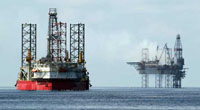Timor Sea oil leak clean-up scaled back, plugging operation planned
 Sydney - Australian authorities Sunday scaled back a three-week operation to disperse oil and gas leaking from a Timor Sea drilling rig operated by Thailand's PTTEP company.
Sydney - Australian authorities Sunday scaled back a three-week operation to disperse oil and gas leaking from a Timor Sea drilling rig operated by Thailand's PTTEP company.
Oil and gas has been leaking from the West Atlas drilling platform, 690 kilometres west of Darwin, since a rupture in an undersea pipe August 21.
The slick from the rig is 170 kilometres from the coast but is reducing in size and requiring less dispersant, a spokeswoman for the Australian Maritime Safety Authority (AMSA) told national broadcaster ABC.
AMSA said scaling back the clean-up operation was appropriate now that a mobile rig towed from Singapore was 2 kilometres from West Atlas and preparing to drill 2.6 kilometres into the sea bed to intersect the leaking well and plug it with drilling mud.
PTTEP expects the drilling to take at least four weeks.
Last week Resources Minister Martin Ferguson said concerns about the environmental impact of the leak had been overstated.
"The latest report available to me indicates no oil-affected wildlife and no evidence of contamination in the area, which is pleasing," he said.
AMSA has been using C-130 Hercules aircraft flying from Darwin each day to keep the spill in check.
PTTEP, which has not revealed what caused the leak, has 300 staff deployed working on the problem and cleaning up the spill.
Speaking at a press conference in Perth on Saturday, PTTEP director Jose Martins said the leak, initially around 400 barrels a day, was diminishing and that his company would cover the cost of the clean-up.
Ferguson said a new agency would be set up to investigate accidents at offshore drilling rigs.
"We want to learn from this incident and take the measures necessary to stop it happening again," he said. "While this is the first blowout in offshore Australia since 1984, and around 1,500 wells have been drilled safely over the last 25 years, there's no room for complacency."
Geochemist Bob Kagi of Perth's Curtin University of Technology noted that oil leaked from the seabed even without the intervention of humans, and that dispersants sprayed onto slicks might be more of a problem than the oil itself.
"I think the reason they're using dispersants is to be seen to be doing something," Kagi said. "Dispersants are often more toxic than the oil itself."
Environmentalists criticized the government for what they perceive as the slow speed of PTTEP in plugging the leak.
They said it already posed a threat to whales, dolphins and turtles, and warned that the slick could easily reach the coast and cause ecological damage. dpa